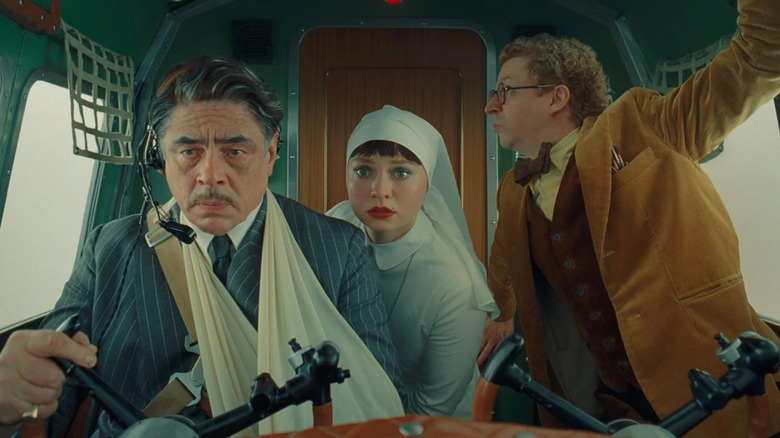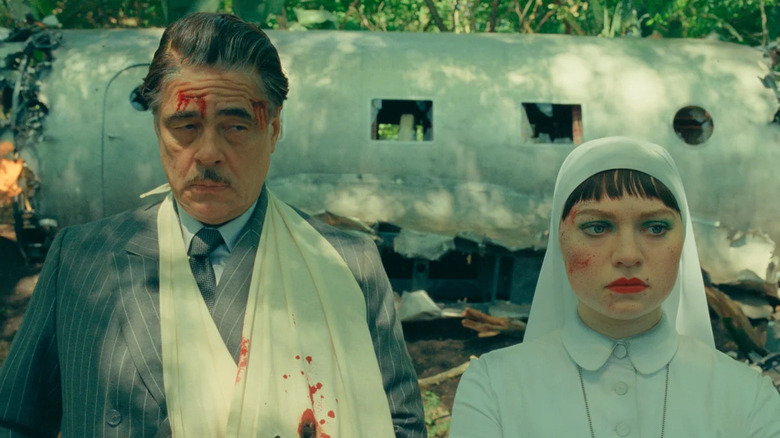This text comprises delicate spoilers for “The Phoenician Scheme.”
Ever because the fall of the Hays Code, violence has turn into the most typical (and generally accepted) transgressive ingredient in American cinema. The place sexual content material continues to be always averted or diminished (typically for good causes, oftentimes for dangerous ones), common audiences have been skilled to not blink a watch at quite a lot of blood being shed. Regardless of the frequent look of violence in cinema, most movies have a rationale for its inclusion: both they’re utilizing violence as a fantastical ingredient, or they’re emphasizing its results to lift dramatic stakes, or to horrify, and so forth.
But whereas quite a few films draw explicit consideration to their violent points, there are comparatively few that may preserve a constant stage of shock to their violence. One filmmaker who can declare the flexibility to do that is, of all individuals, Wes Anderson. On paper, it might appear apparent that any violence in Anderson’s movies can be stunning, given his repute as an arthouse filmmaker whose work is extra involved with intelligence and wit than low-cost thrills. Anderson’s early movies certainly appeared to be grounded of their violence — he definitely wasn’t above the comedic potential of slapstick, however probably the most upsetting moments of violence felt appropriately jarring, such because the self-harm in “The Royal Tenenbaums.” It wasn’t till “The Grand Budapest Resort,” when Deputy Vilmos Kovacs (Jeff Goldblum) had his fingers chopped off by a slamming door, that it felt like Anderson realized the best way to use violence as each a dramatic ingredient and a punchline.
Whereas the moments of violence in Anderson’s movies are sometimes excessive, they’re additionally artfully executed, holding them half and parcel of the director’s tightly managed aesthetic. On this trend, Anderson’s violence completely captures one thing about it that few filmmakers do, which is its uncanny valley high quality. “The Phoenician Scheme” occurs to be Anderson’s most violent film to this point, and it completely works given the best way it makes use of its violence to serve the general tone of the movie and its lead character’s predicament.
The violence in ‘The Phoenician Scheme’ emphasizes the cartoonish plight of its protagonist
Despite the fact that there have been situations of Anderson utilizing moments of violence all through his final a number of films like little bits of seasoning, “The Phoenician Scheme” demonstrates that it should be a really spicy film simply seconds into its runtime. Throughout a doomed flight on the personal airplane of industrialist Zsa-zsa Korda (Benicio del Toro), an assassination try is made on Korda’s life, which is outwardly a recurring drawback for the arms vendor. Korda survives, however his aide doesn’t, as the person is spectacularly blown to smithereens, inflicting the airplane to develop a gap in its fuselage.
That is Anderson’s approach of setting the desk for the movie, not simply its plot (which is paying homage to a stereotypical Nineteen Fifties espionage journey film), however its distinctive tone. Together with Korda being nonplussed about dwelling by means of (and surviving) quite a few makes an attempt on his life, Anderson makes the violence each impactful and cartoonish, leading to an total absurdism. In different phrases, the movie, like Korda, views violence as each actually harmful and annoyingly blasé.
The method to violence within the movie is not a brand new factor for Anderson by way of its impact. His movies regularly deal with high-stakes occasions and conditions with a deadpan detachment; for the very best latest instance, look no additional than the extraterrestrial encounter in “Asteroid Metropolis.” The distinction is that the violence in “The Phoenician Scheme” is threaded all through the film moderately than showing solely on the climax or at one particular second. There’s one thing about it which harkens again to early Jim Henson shorts and Chuck Jones cartoons, by which the violence in these works is equally each brutal and weird. In the end, the ever-present violence within the movie helps emphasize not simply Korda’s plight, but in addition units up his journey as a personality, too.
In the beginning of the film, loss of life holds no that means for him as a result of his life lacks that means, and it is the invention of life’s worth by means of his estranged daughter, Liesl (Mia Threapleton), that enables Korda to try to change himself for the higher. Korda’s non secular and ethical awakening does not diminish the violence within the movie, however makes it perversely extra pleasing; his climactic tussle together with his nemesis, Uncle Nubar (Benedict Cumberbatch), would be the most elaborate bodily struggle Anderson’s ever staged, and it comes off much less like “John Wick” and extra like Merrie Melodies.
Utilizing violence as comedic counterpoint to the movie’s subtext
In the identical approach that Anderson undercuts high-stakes drama with deadpan humor and non-sequiturs, his utilization of violence in “The Phoenician Scheme” contrasts and deepens what’s in the end a really tender story of Korda reconnecting and studying to genuinely love (versus objectively recognize) his daughter Liesl. Korda is a gruff, to-the-point, obsessively business-minded man, and the violence he is subjected to and surrounded by is each a byproduct and trigger for his character. In his world, hand grenades are little greater than souvenirs, to be supplied to enterprise companions like goodies. Anderson makes use of the pious Liesl to steadily peel away this hardened exterior, revealing a tenderness inside the man that maybe he himself wasn’t beforehand conscious of. It is a character arc and archetype that is been seen earlier than — the hardened man of violence with a gooey center — however Anderson is coming at it in his personal distinctive, skewed approach.
One extra side of the movie’s use of violence is the way it additionally supplies comedic counterpoint to Korda’s enterprise dealings, making his negotiations suffused with literal life or loss of life stakes. It is amusing to interpret Korda and his efforts, touring all through the land of Phoenicia attempting to sweet-talk or in any other case cajole his coterie of traders, as a metaphor for an artist trying to acquire funding for his or her craft. Whereas Anderson does not draw a direct comparability between Korda and himself as a filmmaker, the subtext is current for many who want to get a kick out of it. In fact, this interpretation lends itself to its personal comedic counterpoint, with Korda-as-Anderson-alter ego taking a bullet for his traders and handing out hand grenades to them.
In the end, “The Phoenician Scheme” is proof that Anderson now has a agency grasp on using violence for each dramatic and comedic functions, and typically each without delay. Though there is definitely an edginess to graphic violence in cinema each time it is used, there’s a substantial amount of appeal to Anderson’s model of bloody mayhem. The filmmaker clearly has a sort coronary heart, as proven by how typically he has characters verbally apologize for the violence on display. Whereas it is uncertain that we’ll ever see Wes Anderson’s model of a slasher film, “The Phoenician Scheme” signifies that, in contrast to a couple of years in the past when that “Saturday Evening Dwell” sketch was made, it is now rather less unlikely.




